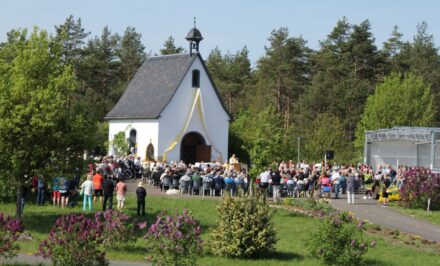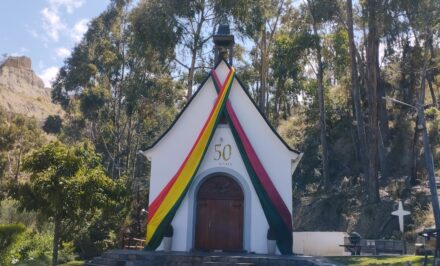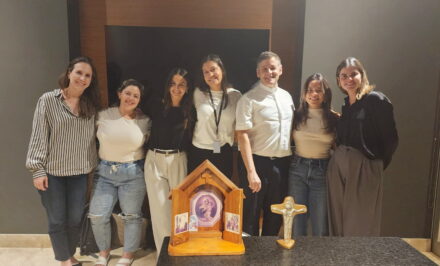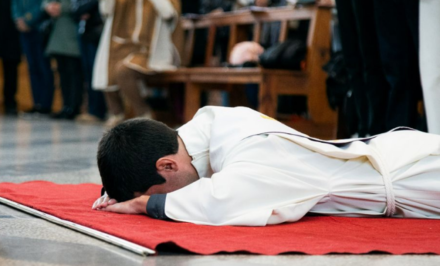 GERMANY, fma. “Living a successful and happy family life today – that is what is desirable and worthwhile striving for despite the difficulties, still today and in the future. Families can learn and experience how it is possible to live a successful and happy family life in Schoenstatt auf’m Berg, Memholz, Germany.” You could read those words in a press report on a variety of events in the framework of Marriage Week in the district of Kempten. Those who were in Memholz two weekends ago (mid January) could experience the truth of those words during a family Mass, at a meeting of the Kentenich Pedagogy course and the latest graduates of the Academy of Family Pedagogy. In the midst of all these events there was still a rapid and intensive preparation for the introductory course on education. “It was a perfectly normal weekend,” according to Gertrud and Norbert Jehle. Except perhaps that before and afterwards building operations were planned, a Cafeteria team planning session took place, and on Sunday afternoon a motto for the celebration on 20 May was formulated …
GERMANY, fma. “Living a successful and happy family life today – that is what is desirable and worthwhile striving for despite the difficulties, still today and in the future. Families can learn and experience how it is possible to live a successful and happy family life in Schoenstatt auf’m Berg, Memholz, Germany.” You could read those words in a press report on a variety of events in the framework of Marriage Week in the district of Kempten. Those who were in Memholz two weekends ago (mid January) could experience the truth of those words during a family Mass, at a meeting of the Kentenich Pedagogy course and the latest graduates of the Academy of Family Pedagogy. In the midst of all these events there was still a rapid and intensive preparation for the introductory course on education. “It was a perfectly normal weekend,” according to Gertrud and Norbert Jehle. Except perhaps that before and afterwards building operations were planned, a Cafeteria team planning session took place, and on Sunday afternoon a motto for the celebration on 20 May was formulated …

“Can you remember how we sat here without a door, surrounded by building dust, with fog all around outside, and here we were full of plans?” Last weekend a couple arrived who were there for the first time after the Memholz Conference (December 2011), and were standing in the new buffet room. It had a door, there was no building dust, outside there was snow and brilliant sunshine, and a great deal already realised of what had been planned with so much enthusiasm a few weeks earlier, and tackled with even more enthusiasm. So this couple and a few others almost missed lunch because they were so filled with amazement by all the changes that had taken place. The new buffet room between the large and small dining rooms is so big and bright that they no longer wanted to leave it. “It’s absolutely impossible!” one of the visitors remarked after a brief introduction. “It’s actually impossible that we have had such a big house here for so many years, and now start to renovate it, and still build a Cafeteria, because we believe that Fr Kentenich is here and still has great plans for the place.” Great plans for families and great plans for his Family.
“How are the others doing; what has grown?”
 A good year has passed since the end of the Academy for Family Pedagogy and the official commissioning, and the families of the course “Bavaria 8” have gathered for a full weekend in Memholz. “How are the others doing? What has grown? What’s on the agenda?” If you have spent two years together on the same course, your interest remains keen and alive, especially when what you have learnt has become something that is very close to your heart and has often been applied in life. So the focal point of the programme was to share experiences. Each couple had brought photos which had been quickly assembled on the first evening and gave rise to a great deal of wonder and joy. “It simply does me good to see that the others are experiencing the same as us; it does us good to share things, and it does us good just to see one another again.” That was how Martin Dold summarised the weekend.
A good year has passed since the end of the Academy for Family Pedagogy and the official commissioning, and the families of the course “Bavaria 8” have gathered for a full weekend in Memholz. “How are the others doing? What has grown? What’s on the agenda?” If you have spent two years together on the same course, your interest remains keen and alive, especially when what you have learnt has become something that is very close to your heart and has often been applied in life. So the focal point of the programme was to share experiences. Each couple had brought photos which had been quickly assembled on the first evening and gave rise to a great deal of wonder and joy. “It simply does me good to see that the others are experiencing the same as us; it does us good to share things, and it does us good just to see one another again.” That was how Martin Dold summarised the weekend.
One evening there was an intensive and very practical discussion of pedagogical subjects. It was inspired by a talk by Fr Heinrich Hug (together with couples from the pedagogy course), which was a “world premier”, as he himself said, on the subject of the diagnosis and cause of psychological disturbances according to Fr Kentenich’s pedagogical principles. There was also a talk on the subject “Life motivated by what is close to your heart instead of New Year resolutions”, and a couple spoke on their favourite pedagogical subject: a well-rounded survey was the conclusion drawn at the closing discussion.
“All three subjects will give us plenty to discuss,” one remarked, and another couple had discovered, “We can’t always have visitors; we need time to be a family together, and to see what is up between ourselves and with the children.”
Kentenich Pedagogy
 Like everything that has grown out of contact with Fr Kentenich’s charism, it started with the life and the cause close to the heart of definite people: the Kentenich Pedagogy Course, a sort of continuation course for people who have graduated from the Academy for Family Pedagogy. Once their hearts have been set on fire for Kentenich’s pedagogy, they want to understand it more deeply. You can almost feel that Fr Heinrich Hug really enjoys opening up new ground with these people who have received an excellent training in Kentenich’s pedagogy. With them he followed up how Fr Kentenich observed, recognised, and evaluated psychological disturbances, and followed up their causes. There are areas, according to Fr Hug, in which this is based on solid ground, and others that still need a great deal of observation and study. This applies also to the step from diagnosis to healing, including a clear line of demarcation between what an educator from the Kentenich school can heal in his spirit and charism, and what lies beyond his or her competence.
Like everything that has grown out of contact with Fr Kentenich’s charism, it started with the life and the cause close to the heart of definite people: the Kentenich Pedagogy Course, a sort of continuation course for people who have graduated from the Academy for Family Pedagogy. Once their hearts have been set on fire for Kentenich’s pedagogy, they want to understand it more deeply. You can almost feel that Fr Heinrich Hug really enjoys opening up new ground with these people who have received an excellent training in Kentenich’s pedagogy. With them he followed up how Fr Kentenich observed, recognised, and evaluated psychological disturbances, and followed up their causes. There are areas, according to Fr Hug, in which this is based on solid ground, and others that still need a great deal of observation and study. This applies also to the step from diagnosis to healing, including a clear line of demarcation between what an educator from the Kentenich school can heal in his spirit and charism, and what lies beyond his or her competence.
Our experiences make up our lives
 As usual Fr Leonhard Erhard managed to piece together and carry forward all the questions, subjects and concerns, and all that remained open, in his sermon at the Sunday Holy Mass at 11 a.m. The Memholz Conference decided at the beginning of the year that this Holy Mass would be for families. Taking up the Sunday Gospel, which centred on the calling of the apostles, he said that our experiences make up our lives. There are key experiences that we return to repeatedly, and about which, like the apostles, we can still recall the time and day on which they happened, even after many years. These are experiences that have marked our lives deeply and affected us for the rest of our lives. These are moments of calling that have opened up the whole of our lives and uphold us. In the calling of the first disciples it was a question of the experience of staying, of understanding and closeness, as well as the mystery that awakened curiosity. It touched them deeply and awakened their interest. So for his disciples Jesus became something like the new foundation for their lives. Since all gathered that morning in the chapel were “called”, Fr Erhard gave them the constructive assurance that Jesus did not call his apostles, and he did not call each one of us (each family, or community or movement), because they were fit for purpose, but because he said: I will make you able to do what I ask you to do for me.
As usual Fr Leonhard Erhard managed to piece together and carry forward all the questions, subjects and concerns, and all that remained open, in his sermon at the Sunday Holy Mass at 11 a.m. The Memholz Conference decided at the beginning of the year that this Holy Mass would be for families. Taking up the Sunday Gospel, which centred on the calling of the apostles, he said that our experiences make up our lives. There are key experiences that we return to repeatedly, and about which, like the apostles, we can still recall the time and day on which they happened, even after many years. These are experiences that have marked our lives deeply and affected us for the rest of our lives. These are moments of calling that have opened up the whole of our lives and uphold us. In the calling of the first disciples it was a question of the experience of staying, of understanding and closeness, as well as the mystery that awakened curiosity. It touched them deeply and awakened their interest. So for his disciples Jesus became something like the new foundation for their lives. Since all gathered that morning in the chapel were “called”, Fr Erhard gave them the constructive assurance that Jesus did not call his apostles, and he did not call each one of us (each family, or community or movement), because they were fit for purpose, but because he said: I will make you able to do what I ask you to do for me.
That is how life succeeds – family life and every life.
Translation: Mary Cole, Manchester, England













